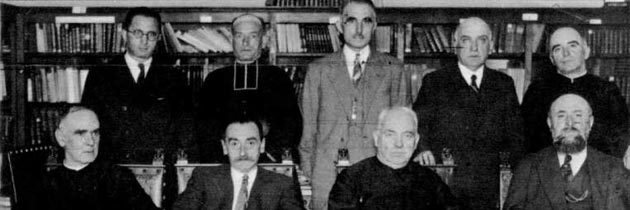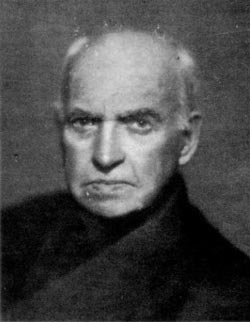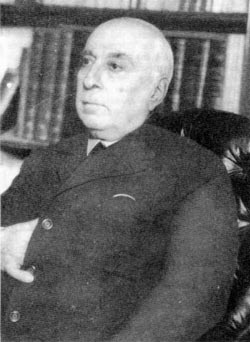 Artetsu Saria 2005
Artetsu Saria 2005
Arbaso Elkarteak Eusko Ikaskuntzari 2005eko Artetsu sarietako bat eman dio Euskonewseko Artisautza atalarengatik
 Buber Saria 2003
Buber Saria 2003
On line komunikabide onenari Buber Saria 2003. Euskonews y Media
 Argia Saria 1999
Argia Saria 1999
Astekari elektronikoari Merezimenduzko Saria

This month, Euskaltzaindia, Academy of the Basque Language, is celebrating its 90th year. Eusko Ikaskuntza would like to congratulate its sister institution and all its members on this anniversary which it feels part of, for historical reasons.
On 5th September 1918, the Language Section of the First Congress on Basque Studies, held in Oñate, agreed to create an organisation for research and guardianship of the Basque Language. For this purpose, a speaker was named who would write up the rules and designate Resurrección María Azkue, Arturo Campión, Luis de Eleizalde and Julio de Urquijo as the first academic numeraries.
On 2nd March 1919, the Eusko Ikaskuntza Permanent Council accepted the project drawn up by its members and presented it to the Local Governments of Alava, Bizkaia, Gipuzkoa and Navarra to gain their approval and their moral and social support.

Resurrección María Azkue Aberasturi.
This project set the new entity’s target “to establish the lexical, phonetic and graphic unification of the language, as the necessary basis for creating thriving literature, as an additional essential preliminary to later, definitive unification of the literary dialect, which all Basques aspire to.” To do this, it considered two different sections: one for scientific research and another relating to guardianship and social action to preserve and disseminate the language.
It was established that the Academy had “wide and absolute autonomy in the scientific area” although maintaining its “subsidiary character in relation to the Company” which should be reflected in the letterheads and printed documents. Regarding its economic means, “it is resolved that the Academy can receive subsidiaries independently from what the Company receives, without affecting the fact that the latter helps to sustain it.” At the start, Eusko Ikaskuntza took responsibility for all costs until it started to generate its first income. Also abundant Place Name and Heritage material was handed over which, in turn, was received by donation when it was founded the year before.
During the spring and summer of 1919, the Local Governments informed the Basque Studies Society of their approval of the Ruling Project. Having completed this process, it was possible to call a constitutive meeting for the new entity, which was verified on the afternoon of 21st September 1919 in the Gipuzkoa Local Government Palace, headquarters for Eusko Ikaskuntza. This was attended by: Resurrección María de Azkue, Arturo Campión, Luis de Eleizalde and Julio de Urquijo, as academic numeraries designated by the Basque Studies Congress; and eight people as mediators who had been entrusted to represent the journals and companies that endorsed the birth of the Academy: Domingo de Aguirre, Pierre Broussain, Abbot Adéma, Ramón Inzagaray, José de Agerre, Juan Bautista de Eguzquiza, P. Raimundo de Olabide and P. Pierre Lhande.
In this first meeting, it was decided that the headquarters would officially be in Bilbao, without affecting the fact that the meetings could be held in San Sebastian or other places thought to be appropriate. In fact, the first two ordinary sessions, on 29th October and 13th November, were held once again in San Sebastian. They approved the academic honour roll and corresponding academics inside and outside the country.
As stated by the historian Idoia Estornés, “the complete framework of this emerging Academy also endorses its quality as daughter of Eusko Ikaskuntza”:

Arturo Campión.
a) Academic Numeraries / Euskaltzainak
R. M.a de Azkue, Severo de Altube, A. Campión, L de Eleizalde, J. B. Eguzkitza, Dámaso de Intza, Ramón de Intzagarai, Georges Lacombe, M. Landerreche, Fierre Lhande, Ramón de Olabide and J. de Urquijo.
b) Honour Roll / Deduzkoak
H. Schuchardt, lecturer from the University of Gratz (Austria); Julien Vinson, lecturer from the faculty of Oriental Languages in Paris; C. C. Uhlenbeck, lecturer from the University of Leyden (Holland).
c) Corresponding Members / Urgazleak
c.a.) Álava: O. de Apraiz, Luis Gz. de Echavarri.
c.b.) Vizcaya: F. de Belausteguigoitia, J.C. de Ibarguchi, G. de Manterola, N. de Oleaga, A. Urriolabeitia, P. de Zamarripa.
c.c.) Gipuzkoa: T. Alzaga, P. de Lardizabal, J.B. Larreta, M. de Lecuona, I. López-Mendizábal, G. de Mújica, P.M. de Urruzuno, J. de Cincunegui.
c.d.) Navarre: T. de Arburua, C. de Caparroso, E. de Echalar, F. de Irigarai, Nicolás Ormaechea.
c.e.) Lower Navarre: J. Etchepare, J. Elissalde, Julien Héguy, F. de St. Jayme.
c.f.) Laburdi: J. B. Daranatz, P. Dourisboure, J. Saint-Pierre.
c.g.) Zuberoa: J. B. Constantin, F. Larrieu, J. de Menditte, J. Urruztoy.
c.h.) Misc. / An-emengoak: M. de Arriandiaga, J. B. Darricarrére, E.S. Dodgson, C. de Echegaray, H. Gavel, A. León, Th. Linschmann, R. Menéndez-Pidal, J. Saroihandy, H. Urtel and H. Winkler.
Comments:
comments powered by Disqus